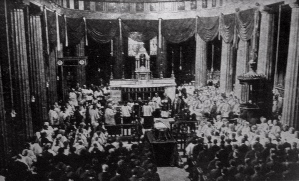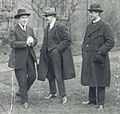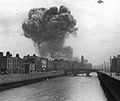Michael Collins (Irish leader) facts for kids
Quick facts for kids
Michael Collins
|
|
|---|---|
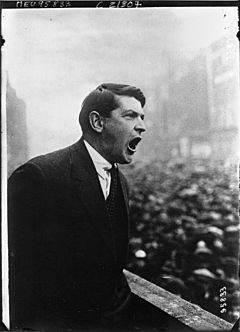
Michael Collins 1922
|
|
| Chairman of the Provisional Government | |
| In office January 1922 – 22 August 1922 |
|
| Preceded by | New office |
| Succeeded by | W. T. Cosgrave |
| Minister for Finance | |
| In office 2 April 1919 – 22 August 1922 |
|
| Preceded by | Eoin MacNeill |
| Succeeded by | W. T. Cosgrave |
| Minister for Home Affairs | |
| In office 22 January 1919 – 1 April 1919 |
|
| Preceded by | New office |
| Succeeded by | Arthur Griffith |
| Teachta Dála | |
| In office May 1921 – August 1922 |
|
| Constituency | Cork Mid, North, South, South East and West |
| In office December 1918 – May 1921 |
|
| Constituency | Cork South |
| Personal details | |
| Born | 16 October 1890 Sam's Cross, County Cork, Ireland |
| Died | 22 August 1922 (aged 31) Béal na mBláth, County Cork, Ireland |
| Political party | Sinn Féin |
Michael "Mick" Collins (Irish: Míċeál Ó Coileáin; 16 October 1890 – 22 August 1922) was an important Irish leader. He helped Ireland gain its independence. He was a Minister for Finance and a Teachta Dála (TD), which means a member of the Irish parliament.
Collins was also a key leader in the IRA. He helped negotiate the Anglo-Irish Treaty with Britain. Later, he became the head of the new Irish government and the leader of the Irish Army. Sadly, he was killed in an ambush in August 1922 during the Irish Civil War.
Contents
- Early Life and Education
- The Easter Rising of 1916
- The First Irish Parliament: Dáil Éireann
- Collins's Role in the War of Independence
- The Anglo-Irish Treaty
- Forming the Provisional Government
- The Irish Civil War Begins
- The Death of Michael Collins
- Remembering Michael Collins
- Images for kids
- See also
Early Life and Education
Michael Collins was born on a farm called Woodfield in West Cork, Ireland. He was the youngest of eight children. Most books say he was born on October 16, 1890. His father, also named Michael, had been part of a group called the Fenians. This group wanted Ireland to be free.
Collins left school when he was 15 years old. He took a test to work for the British government in 1906. In 1910, he moved to London and worked for a company that dealt with money. While in London, he lived with his older sister. He also studied at King's College London.
Joining the Fight for Irish Freedom
In London, Collins joined the London GAA, a sports group. Through this, he joined the Irish Republican Brotherhood (IRB). The IRB was a secret group that wanted Ireland to be independent. In 1915, he moved to another company before returning to Ireland the next year.
The Easter Rising of 1916
Michael Collins became well-known during the Easter Rising in 1916. This was a rebellion against British rule in Ireland. Collins was a very good organiser and smart. He was highly respected in the IRB.
The Rising happened on Easter Monday, 1916. Collins fought in the General Post Office in Dublin. After the Rising, he was arrested and sent to a prison camp.
Collins became a main leader in Sinn Féin after the Rising. This was a small Irish nationalist party. By October 1917, Collins was a key member of Sinn Féin. He also directed the organisation of the Irish Volunteers. Éamon de Valera was the president of both groups.
The First Irish Parliament: Dáil Éireann
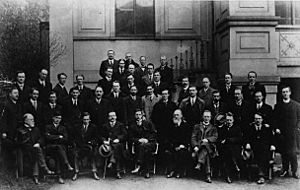
First row, left to right: Laurence Ginnell, Michael Collins, Cathal Brugha, Arthur Griffith, Éamon de Valera, Count Plunkett, Eoin MacNeill, W. T. Cosgrave, Kevin O'Higgins (third row, right)
In 1918, Collins was elected as an Irish Member of Parliament (MP). He represented Cork South for Sinn Féin. But Sinn Féin MPs decided not to go to the British Parliament in London. Instead, they wanted to create their own Irish Parliament in Dublin.
This new parliament was called Dáil Éireann (meaning "Assembly of Ireland"). It first met in the Mansion House, Dublin in January 1919. Many Sinn Féin leaders, including De Valera, had been arrested.
Collins helped de Valera escape from prison in April 1919. De Valera then became the President of Dáil Éireann.
Beginning of the War for Independence
The Irish War of Independence started on the same day the First Dáil met, January 21, 1919. Some IRA volunteers attacked a group of police officers. Two policemen were killed. This event is seen as the start of the war.
Collins's Role in the War of Independence
In 1919, Collins took on many important jobs. He became the president of the IRB. He also became the Director of Intelligence for the Irish Republican Army. This meant he was in charge of gathering secret information.
Collins also became the Minister for Finance for the new Irish Republic. He helped raise a lot of money to fund the new government. Collins and Richard Mulcahy were the main organisers for the IRA. They tried to direct the actions of the different fighting groups.
By 1920, the British government offered a large reward for information leading to Collins's capture or death. He became so famous that people called him "The Big Fellow."
Truce and Treaty Negotiations
In July 1921, the British offered a truce, which meant a stop to the fighting. They arranged a meeting with the leaders of the Irish Republic.
In August 1921, Éamon de Valera became President of the Irish Republic. This made him equal in rank to the British King for the talks. However, de Valera decided not to attend the negotiations himself. Instead, he sent a team of delegates. Arthur Griffith led the team, with Collins as his deputy.
The Anglo-Irish Treaty
The negotiations led to the Anglo-Irish Treaty, signed on December 6, 1921. This agreement created a new state called the "Irish Free State." It also allowed the six counties in the northeast of Ireland to choose to stay with the United Kingdom. If they did, a special group would redraw the border.
Collins believed the Treaty gave Ireland "the freedom to achieve freedom." He knew the treaty, especially the part about dividing Ireland, would not be popular. When he signed it, he famously said, "I have signed my own death warrant."
The Treaty caused a big split in Sinn Féin. The Dáil debated it for ten days. It was finally approved by a vote of 64 to 57.
Forming the Provisional Government
The Treaty was very controversial in Ireland. Éamon de Valera was unhappy that Collins signed the deal without his full approval. Many republicans did not want Ireland to be part of the British Empire. They also did not like having to swear loyalty to the British king.
The division of Ireland was less controversial at first. Collins secretly planned to fight against the Northern State. He sent IRA units and money to the border in early 1922.
A new government, called the Provisional Government, was formed under Collins. He became its President, like a Prime Minister. He also remained Minister for Finance in the republican government.
In the months before the civil war, Collins tried to prevent fighting among Irish nationalists. He made a deal with de Valera, called "The Collins/De Valera Pact." This pact aimed for both sides of Sinn Féin to work together in the first election for the Free State. However, this pact did not last.
Collins also suggested a republican constitution for the Free State. This constitution would not mention the British king. But the British did not agree to this change.
The Irish Civil War Begins
On April 14, 1922, about 200 anti-Treaty IRA men took over the Four Courts building in Dublin. This was a challenge to the new Provisional Government. Collins wanted to avoid a civil war. He did not attack them until June 1922, when British pressure forced him to act.
After trying to get the men to leave peacefully, Collins used two large cannons borrowed from the British. He bombarded the Four Courts until the men surrendered. This event led to the Irish Civil War. Fighting broke out in Dublin between the anti-Treaty IRA and the government's troops.
Under Collins's leadership, the Free State quickly took control of Dublin. By July 1922, anti-Treaty forces held many areas in the south of the country. De Valera and other anti-Treaty leaders supported the anti-Treaty IRA.
By mid-1922, Collins became the Commander-in-Chief of the National Army. This was a formal army formed from the pro-Treaty IRA.
Collins, along with Richard Mulcahy and Eoin O'Duffy, planned attacks by sea to retake areas held by republicans. They successfully took back Munster and the west in July and August 1922. During this time, Collins traveled to his home county of Cork. His friends warned him not to go. Collins reportedly said, "They wouldn't shoot me in my own county."
He wrote in his diary about his plan for peace. He wanted republicans to accept the people's decision on the Treaty. He said they could "go home without their arms." He wanted to avoid more destruction and loss of life. But he also said if they did not accept his terms, any more bloodshed would be their fault.
The Death of Michael Collins
On August 22, 1922, Collins was on a road near Bandon. He stopped to ask for directions in a village called Béal na mBláth (Irish for "the Mouth of Flowers"). The man he asked was a member of the local anti-Treaty IRA. An ambush was then set up for Collins's group when they returned. The ambush party opened fire on Collins's convoy.
Collins was killed in the gunfight, which lasted about 20 minutes. He was the only person who died. He had ordered his group to stop and fight back. His companion, Emmet Dalton, wanted to drive away to safety. It is not known who fired the shot that killed him.
Collins's body was taken to Cork and then shipped to Dublin. People feared his body might be stolen if transported by road. His body lay in state for three days in Dublin City Hall. Tens of thousands of people came to pay their respects. His funeral mass was held at Dublin's Pro Cathedral. About 500,000 people attended his funeral. This was almost one-fifth of Ireland's population at the time.
Remembering Michael Collins
An event to remember Michael Collins happens every August. It takes place at the ambush site in Béal na mBláth, Cork. There is also a ceremony at his grave in Glasnevin Cemetery.
Societies and Culture
The Collins 22 Society was started in 2002. It is a group that works to keep the memory of Michael Collins alive.
Collins has been featured in many films. The 1996 movie Michael Collins, directed by Neil Jordan, starred Liam Neeson as Collins.
Images for kids
-
Michael Collins and Arthur Griffith
-
Members of the First Dáil First row, left to right: Laurence Ginnell, Michael Collins, Cathal Brugha, Arthur Griffith, Éamon de Valera, Count Plunkett, Eoin MacNeill, W. T. Cosgrave, Kevin O'Higgins (third row, right)
-
Harry Boland (left), Michael Collins (middle), and Éamon de Valera (right).
-
Collins in London as delegate to the Anglo-Irish Treaty negotiations.
-
The Provisional Government, led by Collins, gave the order to bombard the Four Courts with artillery shells in an attempt to remove the anti-Treaty IRA. This was the start of the Irish Civil War.
-
Michael Collins and Richard Mulcahy at Arthur Griffith's funeral, a few days before Collins's own death.
-
Wax figure of Michael Collins at the National Wax Plus Museum, Dublin, Ireland.
See also
 In Spanish: Michael Collins (líder irlandés) para niños
In Spanish: Michael Collins (líder irlandés) para niños
 | Lonnie Johnson |
 | Granville Woods |
 | Lewis Howard Latimer |
 | James West |


